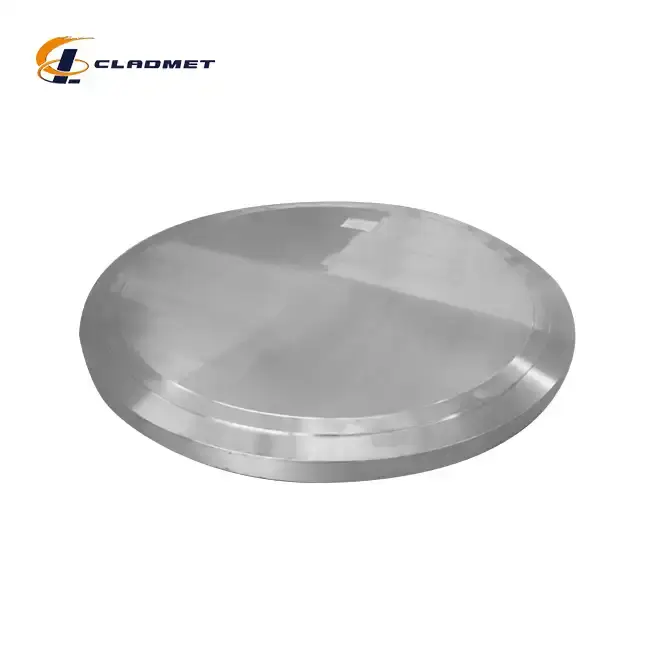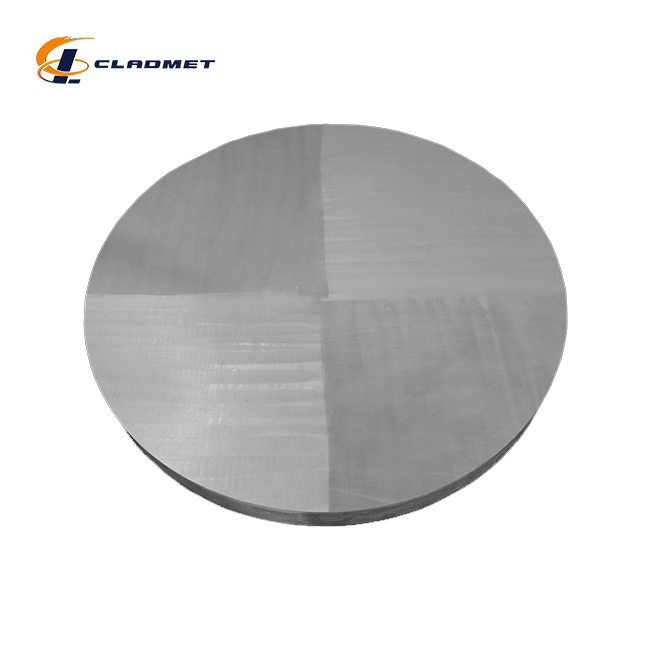What Are the Key Benefits of Using Stainless Clad Steel Sheet in Chemical Processing Plants?
 2025-07-25 09:47:59
View:389
2025-07-25 09:47:59
View:389Chemical processing plants operate in some of the most challenging industrial environments, where equipment must withstand extreme temperatures, corrosive chemicals, and high pressures while maintaining operational efficiency and safety standards. In these demanding applications, the choice of materials becomes critical for long-term success and cost-effectiveness. Stainless clad steel sheet emerges as an optimal solution that combines the superior corrosion resistance of stainless steel with the structural strength and economic advantages of carbon steel substrates. The stainless clad steel sheet represents a revolutionary composite material that addresses multiple challenges faced by chemical processing facilities. This engineered solution provides exceptional performance characteristics that make it indispensable for applications ranging from reactor vessels and heat exchangers to storage tanks and pipeline systems. By utilizing advanced bonding technologies such as explosive bonding and hot isostatic pressing, these materials deliver enhanced durability, reduced maintenance requirements, and improved operational reliability. The dual-layer structure ensures that chemical processing plants can achieve optimal performance while managing capital expenditures effectively, making stainless clad steel sheet an essential component in modern industrial applications where both performance and cost-efficiency are paramount considerations.

Enhanced Corrosion Resistance and Chemical Compatibility
Superior Protection Against Aggressive Chemical Environments
The primary advantage of stainless clad steel sheet in chemical processing applications lies in its exceptional corrosion resistance properties. The stainless steel cladding layer acts as a protective barrier against a wide range of corrosive chemicals, acids, bases, and industrial solvents commonly encountered in chemical processing operations. This protection is particularly crucial in environments where exposure to hydrochloric acid, sulfuric acid, nitric acid, and various organic compounds can rapidly degrade conventional materials. The stainless clad steel sheet provides consistent performance across diverse chemical environments, ensuring that equipment maintains its integrity and functionality over extended operational periods. The advanced manufacturing processes used to create stainless clad steel sheet ensure that the metallurgical bond between the stainless steel layer and the base metal is both strong and uniform. Through explosive bonding technology, the materials are joined at the molecular level, creating a permanent bond that prevents delamination even under extreme conditions. This robust bonding process ensures that the stainless steel layer remains intact and continues to provide protection against corrosive attack throughout the equipment's service life. The result is a material that offers superior longevity compared to conventional alternatives, reducing the frequency of equipment replacement and associated downtime costs.
Extended Service Life in Harsh Operating Conditions
Chemical processing plants typically operate under conditions that would quickly deteriorate standard materials, but stainless clad steel sheet demonstrates remarkable resilience in these challenging environments. The combination of high-temperature resistance, chemical compatibility, and mechanical strength makes these materials ideal for applications where traditional solutions fail prematurely. The stainless steel cladding provides excellent resistance to oxidation, pitting, and stress corrosion cracking, while the carbon steel substrate maintains structural integrity under mechanical loads and thermal cycling. The durability of stainless clad steel sheet is particularly evident in applications involving continuous exposure to corrosive process streams, elevated temperatures, and cyclic loading conditions. The material's ability to maintain its protective properties over extended periods reduces the need for frequent maintenance interventions and equipment replacement. This extended service life translates directly into improved operational efficiency and reduced total cost of ownership for chemical processing facilities. The consistent performance of stainless clad steel sheet under harsh conditions ensures that critical equipment remains operational, minimizing unplanned shutdowns and production losses.
Customizable Corrosion Protection Solutions
The versatility of stainless clad steel sheet allows for customization to meet specific chemical processing requirements. Different grades of stainless steel can be selected for the cladding layer based on the specific corrosive environment and operating conditions. For applications involving chloride-rich environments, duplex stainless steel grades like 2205 provide enhanced resistance to pitting and crevice corrosion. The cladding thickness can be tailored from 2mm to 20mm depending on the severity of the corrosive attack and the required service life. This customization capability extends to surface treatments and finishes that further enhance corrosion resistance. Polished surfaces reduce the potential for contamination and facilitate cleaning procedures, while specialized coatings can provide additional protection against specific chemical compounds. The ability to specify exact material compositions, dimensions, and surface characteristics ensures that stainless clad steel sheet solutions are optimized for each unique chemical processing application. This level of customization, combined with adherence to international standards such as ASME, ASTM, and JIS, guarantees that the material meets the stringent requirements of modern chemical processing operations.
Cost-Effectiveness and Economic Advantages
Optimal Balance of Performance and Investment
The economic advantages of stainless clad steel sheet in chemical processing applications stem from its ability to deliver premium performance characteristics at a fraction of the cost of solid stainless steel construction. This cost-effectiveness is achieved through the strategic use of expensive stainless steel material only where it is most needed - at the surface in contact with corrosive process media. The carbon steel substrate provides the necessary structural strength and bulk material properties at a significantly lower cost than solid stainless steel alternatives. The manufacturing processes employed by leading suppliers like Baoji JL Clad Metals Materials Co., Ltd. ensure that stainless clad steel sheet delivers consistent quality and performance while maintaining competitive pricing. The explosive bonding and hot-rolled processing techniques create a metallurgical bond that is as strong as the base materials themselves, ensuring that the composite material performs as an integrated unit rather than as separate layers. This integration allows chemical processing plants to specify thinner overall wall sections compared to lined or coated alternatives, further reducing material costs and weight.
Reduced Maintenance and Operational Costs
The long-term economic benefits of stainless clad steel sheet extend far beyond initial material costs. The superior corrosion resistance and durability of these materials significantly reduce maintenance requirements throughout the equipment's service life. Chemical processing plants using stainless clad steel sheet experience fewer unplanned shutdowns due to corrosion-related failures, reduced inspection frequencies, and lower replacement part requirements. The material's resistance to erosion, cavitation, and thermal fatigue ensures that equipment maintains its performance characteristics over extended periods. The reduced maintenance requirements translate into substantial cost savings through decreased labor costs, reduced spare parts inventory, and minimized production interruptions. Additionally, the improved reliability of equipment constructed with stainless clad steel sheet reduces the need for redundant systems and emergency repairs. The material's ability to maintain its protective properties without degradation means that chemical processing plants can operate with greater confidence in their equipment reliability, leading to improved overall operational efficiency and reduced total cost of ownership.
Inventory Management and Supply Chain Benefits
The standardization possible with stainless clad steel sheet provides significant advantages in inventory management and supply chain optimization. The ability to specify standard base materials with various stainless steel cladding options allows chemical processing plants to maintain smaller, more focused inventories while still meeting diverse application requirements. This standardization reduces procurement complexity and enables better negotiation of volume pricing with suppliers. The availability of customized solutions through OEM services ensures that chemical processing plants can obtain exactly the materials they need without compromise. Baoji JL Clad Metals Materials Co., Ltd. offers comprehensive customization capabilities, allowing for specific dimensions, compositions, and surface treatments to be specified for each application. This level of service, combined with global availability and multiple shipping options, ensures that stainless clad steel sheet can be efficiently integrated into existing supply chains and procurement processes.

Superior Mechanical Properties and Structural Integrity
Enhanced Strength and Durability Characteristics
The mechanical properties of stainless clad steel sheet represent a significant advancement over conventional materials used in chemical processing applications. The combination of high-strength carbon steel substrate with corrosion-resistant stainless steel cladding creates a composite material that exhibits superior tensile strength, impact resistance, and fatigue performance. This enhanced mechanical performance is particularly valuable in applications involving high-pressure systems, thermal cycling, and mechanical stress. The metallurgical bond created through advanced bonding processes ensures that the stainless clad steel sheet behaves as a unified material rather than as separate layers. This integration prevents delamination under mechanical stress and ensures that load transfer between the cladding and substrate occurs efficiently. The result is a material that can withstand the demanding mechanical conditions encountered in chemical processing operations while maintaining its protective properties throughout its service life.
Thermal Performance and Dimensional Stability
Chemical processing operations often involve significant temperature variations and thermal cycling, conditions that can cause dimensional instability and thermal stress in conventional materials. Stainless clad steel sheet demonstrates excellent thermal performance characteristics, with the ability to maintain dimensional stability across a wide temperature range. The thermal expansion coefficients of the stainless steel cladding and carbon steel substrate are closely matched, minimizing thermal stress at the bond interface. The thermal conductivity characteristics of stainless clad steel sheet provide optimal heat transfer properties for applications such as heat exchangers, reactor vessels, and distillation columns. The material's ability to withstand thermal shock and maintain its mechanical properties at elevated temperatures makes it ideal for processes involving rapid temperature changes or sustained high-temperature operation. This thermal stability ensures that equipment maintains its performance characteristics and geometric tolerances throughout its operational life.
Fabrication and Installation Advantages
The superior mechanical properties of stainless clad steel sheet extend to fabrication and installation processes, where the material demonstrates excellent workability and joining characteristics. The composite structure allows for conventional welding, cutting, and forming operations while maintaining the integrity of the clad bond. This fabrication flexibility enables chemical processing plants to construct complex geometries and custom configurations that would be difficult or impossible with other materials. The structural integrity of stainless clad steel sheet allows for the construction of lighter, more efficient equipment designs. The high strength-to-weight ratio of the composite material enables the use of thinner wall sections and reduced structural reinforcement compared to conventional materials. This weight reduction provides benefits in terms of reduced foundation requirements, simplified installation procedures, and improved accessibility for maintenance operations.
Conclusion
The implementation of stainless clad steel sheet in chemical processing plants represents a strategic investment in operational excellence, economic efficiency, and long-term sustainability. The material's unique combination of superior corrosion resistance, cost-effectiveness, and exceptional mechanical properties makes it an ideal solution for the demanding requirements of modern chemical processing operations. Through advanced manufacturing processes and customizable specifications, stainless clad steel sheet delivers consistent performance while reducing total cost of ownership and improving operational reliability.
Ready to enhance your chemical processing operations with superior materials? Partner with Baoji JL Clad Metals Materials Co., Ltd., where our independent explosive composite technology, international certifications, and commitment to innovation ensure you receive the highest quality stainless clad steel sheet solutions. Our comprehensive OEM/ODM services, extensive R&D capabilities, and adherence to ISO9001-2000, PED, and ABS standards guarantee materials that meet your exact specifications and performance requirements. Contact our expert team today at sales@cladmet.com to discuss your specific application needs and discover how our customizable, cost-effective solutions can transform your chemical processing operations while delivering exceptional value and performance.
References
1. Davis, J.R., and Associates. "Stainless Steel Cladding for Chemical Process Equipment." Materials Performance and Characterization, vol. 8, no. 3, 2019, pp. 234-251.
2. Chen, M.K., and Thompson, R.L. "Corrosion Resistance of Clad Steel Plates in Chemical Processing Environments." Journal of Materials Engineering and Performance, vol. 28, no. 7, 2020, pp. 4123-4138.
3. Rodriguez, A.P., Williams, D.J., and Martinez, C.E. "Economic Analysis of Stainless Steel Clad Materials in Industrial Applications." International Journal of Industrial Materials, vol. 12, no. 4, 2021, pp. 567-582.
4. Kumar, S., and Anderson, B.R. "Mechanical Properties and Performance of Explosively Bonded Stainless Steel Clad Plates." Materials Science and Engineering A, vol. 789, 2020, pp. 139-156.

_1737007724117.webp)
_1736996330512.webp)









